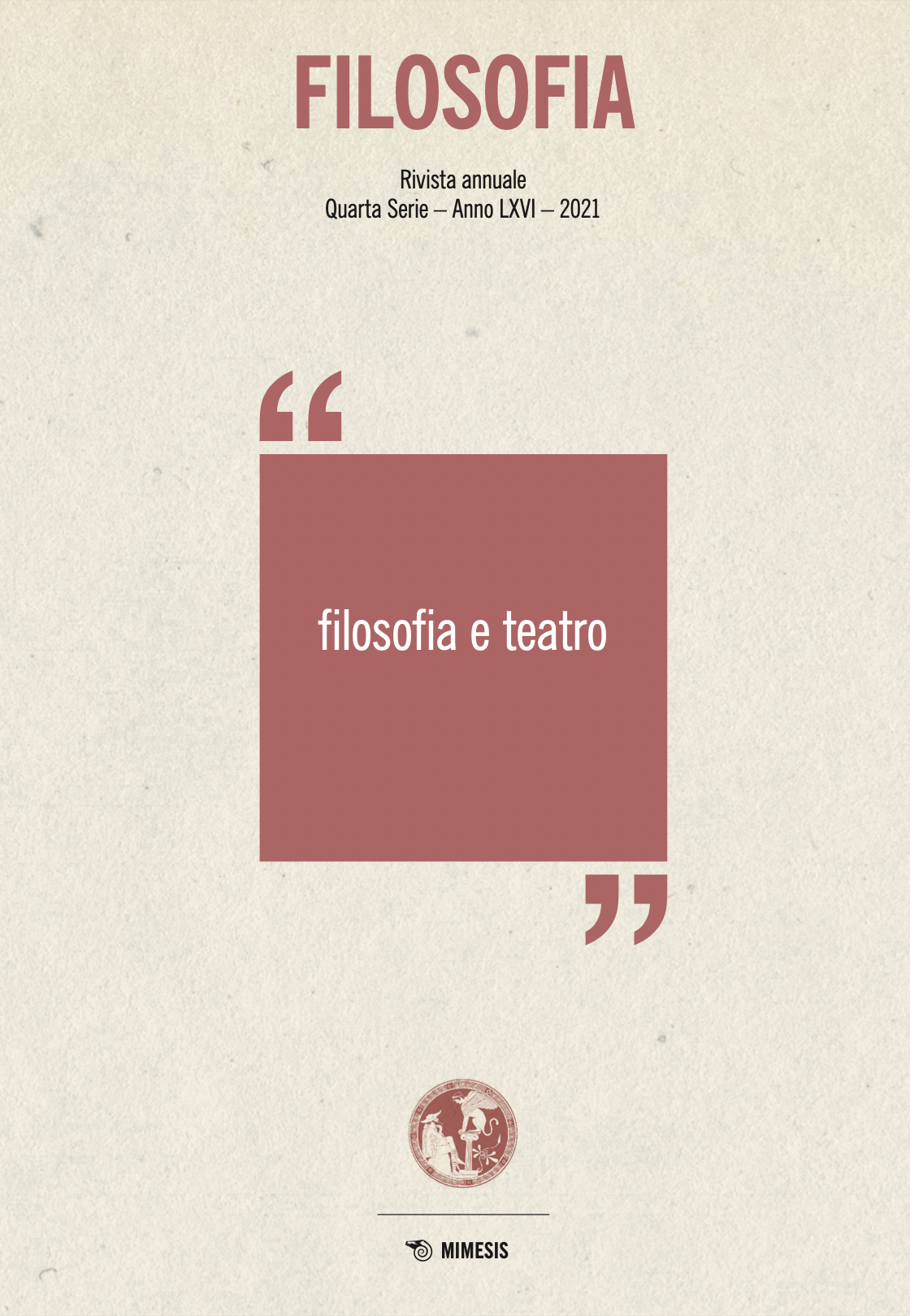Le devant de la scène rituelle
L’ethnologie de la possession et la double conscience
DOI:
https://doi.org/10.13135/2704-8195/6273Parole chiave:
possession, self-consciousness, De Martino, Leiris, MétrauxAbstract
Le point de départ de cette contribution est l’usage constant de la métaphore théâtrale dans les études de la possession rituelle réalisées par Leiris, Métraux et De Martino. Cet usage vise à rendre compte d’un phénomène qui hante la modernité, et dont il faudra retrouver les traces dans la longue durée, depuis Platon jusqu’à Sartre : le dédoublement de la conscience chez les acteurs rituels. L’article se concentre notamment sur le problème théorique posé par l’écart inéliminable séparant le devant de la scène théâtrale du devant de la scène rituelle. D’abord, nous confronterons les démarches des trois anthropologues et examinerons les difficultés soulevées par l’emploi de la notion sartrienne de mauvaise foi. Nous nous attacherons notamment à montrer ce que cette notion recouvre : la production d’un symbolisme individuel capable de répondre à une crise spécifique. Ensuite, nous remonterons aux sources de l’usage de la métaphore théâtrale, utilisée alternativement par la psychopathologie et par la philosophie afin de rendre compte des dédoublements normaux ou pathologiques de la conscience. Enfin, nous chercherons à esquisser une nouvelle dramatique du rituel, capable de dépasser l’attrait implicite pour une psychopathologie des possédés.
Downloads
Riferimenti bibliografici
Barbera, Sandro. 2016. « ‘Presenza’ e ‘mondo’. Modelli filosofici nell’opera di Ernesto de Martino », in La contraddizione felice? Ernesto de Martino e gli altri, sous la direction de Riccardo Di Donato, 103-127. Pisa : Edizioni ETS.
Bergson, Henri. 2012. Le souvenir du présent et la fausse reconnaissance. Paris : PUF.
Bergson, Henri. 1900. Le rire. Essai sur la signification du comique. Paris : Félix Alcan.
Cabestan, Philippe. 2005. « Sartre et la psychanalyse : cécité ou perspicacité ? ». Cités 22, n. 2 : 99-110.
Cassin Barbara, sous la direction de. 2004. Vocabulaire européen des philosophies. Dictionnaire des intraduisibles. Paris : Seuil / Le Robert.
Charuty, Giordana. 2009. Ernesto de Martino : Les vies antérieures d’un anthropologue. Marseille : Parenthèses.
Csapo, Eric, et Margaret C. Miller. 2007. The Origins of Theater in Ancient Greece and Beyond. From Ritual to Drama. Cambridge : Cambridge University Press.
Debaene, Vincent. 2010. L’adieu au voyage. L’ethnologie française entre histoire et littérature. Paris : Gallimard.
De Martino, Ernesto. 1951. « Il folklore progressivo emiliano », Emilia 21 : 251-254.
De Martino, Ernesto. 1961. « Tarantismo e coribantismo ». Studi e materiali di storia delle religioni 32, n. 2 : 187-203.
De Martino, Ernesto. 1966. La Terre du remords. Tr. fr. Claude Poncet. Paris : Gallimard.
De Martino, Ernesto. 1996. L’opera a cui lavoro. Lecce : Argo.
De Martino, Ernesto. 1995. Storia e metastoria. I fondamenti di una teoria del sacro. Lecce : Argo.
Fabre, Daniel. 1999. « Un rendez-vous manqué. Ernesto De Martino et sa réception en France ». L’Homme 151 : 207-236.
Gernet, Louis. 1981. Anthropologie de la Grèce antique. Paris : Champs-Flammarion.
Janet, Pierre. 1889. L’automatisme psychologique. Paris : Félix Alcan.
Janet, Pierre. 1903. Les obsessions et la psychasthénie, I. Paris : Félix Alcan.
Janet, Pierre. 1928. De la grâce à l’extase, II. Paris : Félix Alcan.
Jervis, Giovanni. 1986. « Alcune intuizioni psicologiche ». La Ricerca Folklorica 13 : 65-67.
Laurière, Christine. 2005. « D’une île à l’autre. Alfred Métraux en Haïti ». Gradhiva 1 : 181-207.
Leiris, Michel. 1939. L’Âge d’homme. Paris : Gallimard.
Leiris, Michel. 1958. « Regard vers Alfred Métraux », in M. Leiris, Cinq études d’ethnologie, 129-137. Paris : Gallimard.
Leiris, Michel. 1987. Roussel l’ingénu. Paris : Fata Morgana.
Leiris, Michel. 2003. « La possession et ses aspects théâtraux chez les Éthiopiens de Gondar », in M. Leiris, Miroir de l’Afrique, édité par Jean Jamin, 947-1061. Paris : Gallimard.
Linforth, Ivan M. 1946. « The corybantic rites in Plato ». University of California publications in classical philology 13, n. 5 : 121-162.
Métraux, Alfred. 1958. Le vaudou haïtien. Paris : Gallimard.
Platon. 2020. Œuvres complètes. Paris : Flammarion.
Regnault, François. 2018. « Théâtre et philosophie. Le dithyrambe et la légende ». Revue de métaphysique et de morale 98, n. 2 : 151-172.
Roudinesco, Élisabeth. 1986. La bataille des cent ans. Histoire de la psychanalyse en France. 2, 1925-1985. Paris : Seuil.
Sartre, Jean-Paul. 1966. La Transcendance de l’Ego. Esquisse d’une description phénoménologique. Paris : Vrin.
Sartre, Jean-Paul. 2017 (1943). L’Être et le Néant. Paris : Gallimard.
Schwartz, Louis. 1955. Les névroses et la psychologie de Pierre Janet. Paris : PUF.
Severi, Carlo. 1999. « Une pensée inachevée : l’utopie anthropologique de Ernesto De Martino ». Gradhiva 26 : 99-107.
Severi, Carlo. 2004. Il percorso e la voce. Un’antropologia della memoria. Torino: Einaudi.
Talamonti, Adelina. 2001. « Dissociazione psichica e possessione. Note su de Martino e Janet ». Antropologia 1 : 55-76.
Velardi, Roberto. 1989. Enthousiasmòs. Possessione rituale e teoria della comunicazione poetica in Platone. Roma : Edizioni dell’Ateneo.
##submission.downloads##
Pubblicato
Come citare
Fascicolo
Sezione
Licenza
Filosofia applica una licenza Creative Commons Attribution 4.0 International License a tutto il materiale pubblicato.



